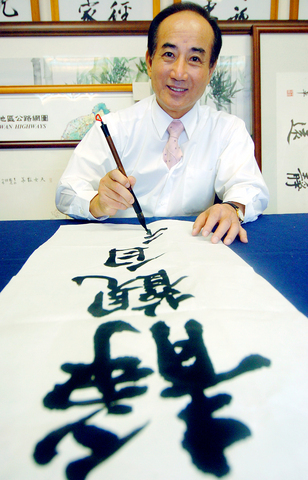When it comes to raw talent, lawmakers are not always one-trick ponies.
Legislative Speaker Wang Jin-pyng (
Sitting at his office desk, Wang raised his brush in the vertical manner of Chinese calligraphers and began to write. For Wang, Chinese calligraphy is more of a passion than a hobby.

PHOTO: CHANG CHIA-MING, TAIPEI TIMES
The 64-year-old son of a farmer was first introduced to Chinese calligraphy when he was in the third grade at school. He soon represented his school to win the bronze medal in a county Chinese calligraphy competition.
The native son of Kaohsiung County said that he learns concentration and patience from the art of calligraphy.
In addition to calligraphy, Wang is a talented athlete.
He was a senior-high-school champion in the long jump, triple jump, shot put and tennis. He was also captain of his university's tennis team and won a bronze medal in inter-collegiate tennis competitions when he was in his senior year.
No matter how hectic or onerous things are at the legislature, Wang usually looks serene and calm. He attributes his serenity to inborn temperament.
"If you see through things, you behave with perfect composure," he said. "Coming from a big family also teaches me to be sensitive to others' feelings, tolerant, respectful to others' opinions and a team player."
His Buddhist beliefs also help him get through many difficult times in life, he said.
Wang was familiar with Buddhism from a tender age. His parents lived close by a Buddhist temple. He started to seriously study Buddhism in 1986, after he heard the call of Buddha.
"The religion inspires me to think thoroughly, clearly and to be flexible," he said.
Democratic Progressive Party (DPP) Legislator Yeh Yi-jin (
The 45-year-old native of Tainan began to play piano when she was in the second grade. Her mother wanted her three daughters to learn a professional skill so they could support themselves whether they got married or not.
Yeh did get married and obtained a masters degree in music from the University of Bridgeport in Connecticut, but she did not stay in music circles because of her grudge against her former employer, National Tainan Normal College, where she had taught music for four years.
She was passed over in the appointment of a full-time lecturer because she was labeled by school authorities as a "problem teacher" for vocalizing her political opinions.
"I was very angry when I found out the reason they rejected my application," she said. "I told myself if they disliked my talking about politics so much, I would take it somewhere else."
She was soon recruited by the DPP to run in the 1995 provincial councilor elections, and won her seat. She then moved on to win the legislative election in 1998 and has been re-elected ever since.
She said she has never found it hard to adjust to the political life nor has she had to change herself a lot.
"I usually adopt the most simple and direct way to face the most complicated situation, simply because I am a simple and straightforward person," she said.
In addition to playing the piano, Yeh is an avid reader. Despite her busy schedule, Yeh always finds time to read and play the piano.
"It's only when I'm playing the piano that I am focused," she said.
Taiwan Solidarity Union (TSU) Legislator Kuo Lin-yung (
The oil-painting class his wife attended rekindled the fervor he developed for the art in elementary school. He later signed up for the class himself and specialized in painting landscapes and still lifes.
He was surprised to see his artistic talent receiving kudos when he and his wife held their first joint exhibition two years ago in Tai-chung. Instead of selling his works of art, Kuo auctioned them off and donated the money to charity.
In addition to painting, the lawyer-turned-politician was very much into sports.
He was the captain of the baseball team at senior high, university and graduate school. He was also an intramural champion in the hurdles and 400m relay.
Kuo returned to practicing law in 1986 when he lost the legislative election, but made a comeback last year when he was assigned as a legislator-at-large by his party.
Talking about the 19-year political hiatus, Kuo said that what keeps him going is his love for life and responsibility toward the public.
"There is more than one battlefield in our life and the most important thing is always to have faith and do the best you can," he said.

A strong continental cold air mass is to bring pollutants to Taiwan from tomorrow, the Ministry of Environment said today, as it issued an “orange” air quality alert for most of the country. All of Taiwan except for Hualien and Taitung counties is to be under an “orange” air quality alert tomorrow, indicating air quality that is unhealthy for sensitive groups. In China, areas from Shandong to Shanghai have been enveloped in haze since Saturday, the ministry said in a news release. Yesterday, hourly concentrations of PM2.5 in these areas ranged from 65 to 160 micrograms per cubic meter (mg/m³), and pollutants were

Taiwan’s armed forces have established response protocols for a wide range of sudden contingencies, including the “Wan Chun Plan” to protect the head of state, the Ministry of Defense (MND) said today. After US President Donald Trump on Saturday launched a series of airstrikes in Venezuela and kidnapped Venezuelan President Nicolas Maduro, concerns have been raised as to whether China would launch a similar “decapitation strike” on Taiwan. The armed forces regularly coordinate with relevant agencies and practice drills to ensure preparedness for a wide range of scenarios, Vice Minister of National Defense Hsu Szu-chien (徐斯儉) told reporters before a

EVA Airways on Saturday said that it had suspended a pilot and opened an investigation after he allegedly lost his temper and punched the first officer several times as their plane was taxiing before takeoff at Los Angeles International Airport. According to a report published on Thursday by The Reporter, the incident occurred after the flight’s Malaysian first officer tried to warn the Taiwanese pilot, surnamed Wen (文), that he was taxiing faster than the speed limit of 30 knots (55.6kph). After alerting the pilot several times without response, the first officer manually applied the brakes in accordance with standard operating

The New Taipei City Social Welfare Department on Thursday celebrated Paralympic competitor Chen Tzu-wei (張孜維), who received last year’s national Golden Eagle award for exemplary achievement by Taiwanese with disabilities. Chen, who suffers from childhood-onset muscular dystrophy, did not attend the first award ceremony held by the Ministry of Health and Welfare in November due to illness. Chen was formally presented with the award at the department, where he gave thanks to government workers for supporting his education and livelihood, the department said in a statement. Chen was raised by the Ai-hsin Home for Persons with Disabilities in the city’s Bali District (八里)